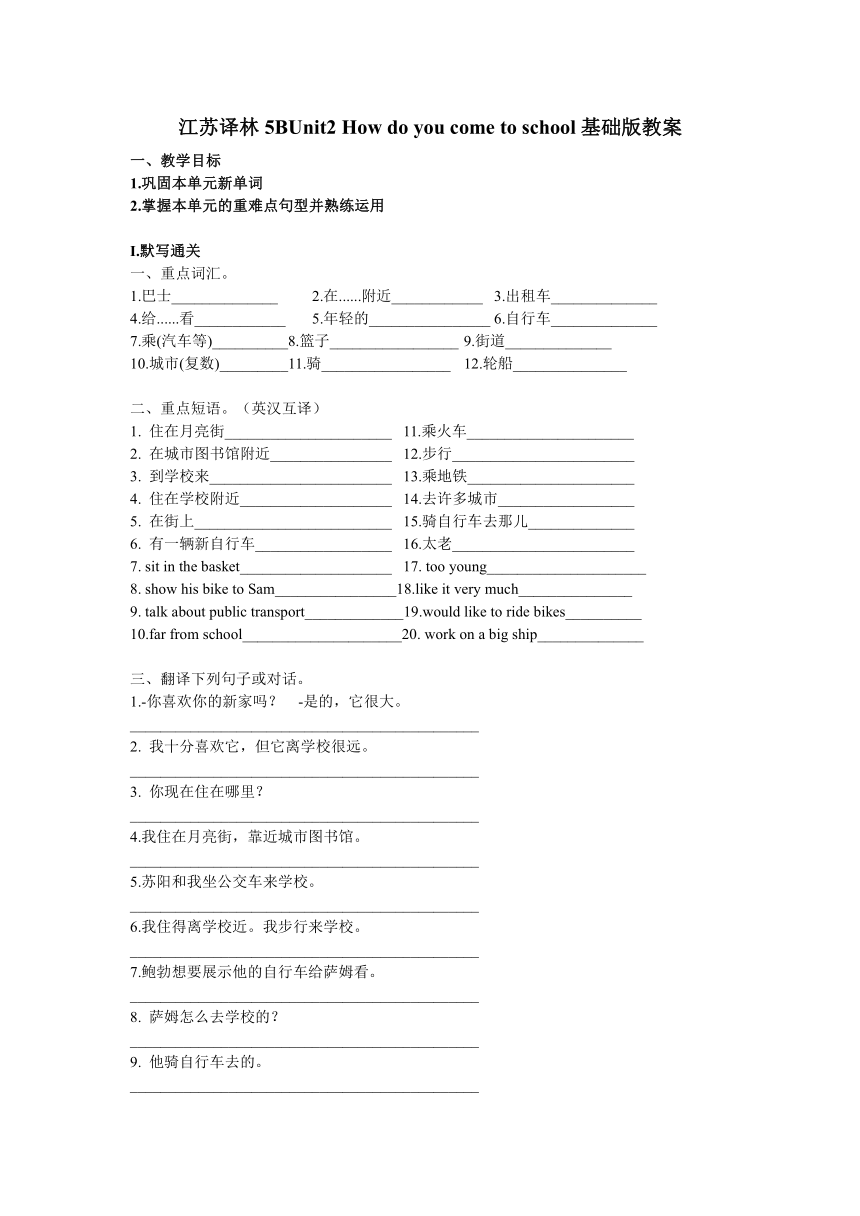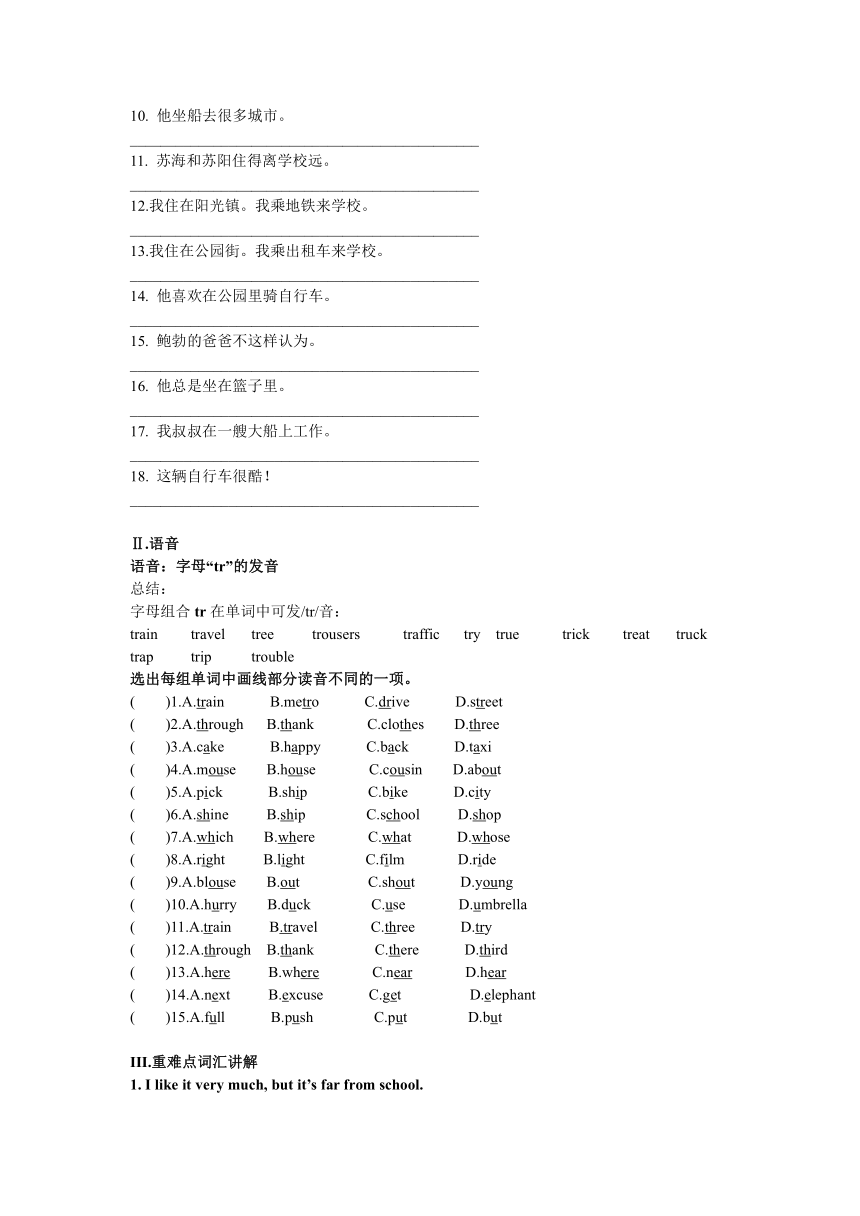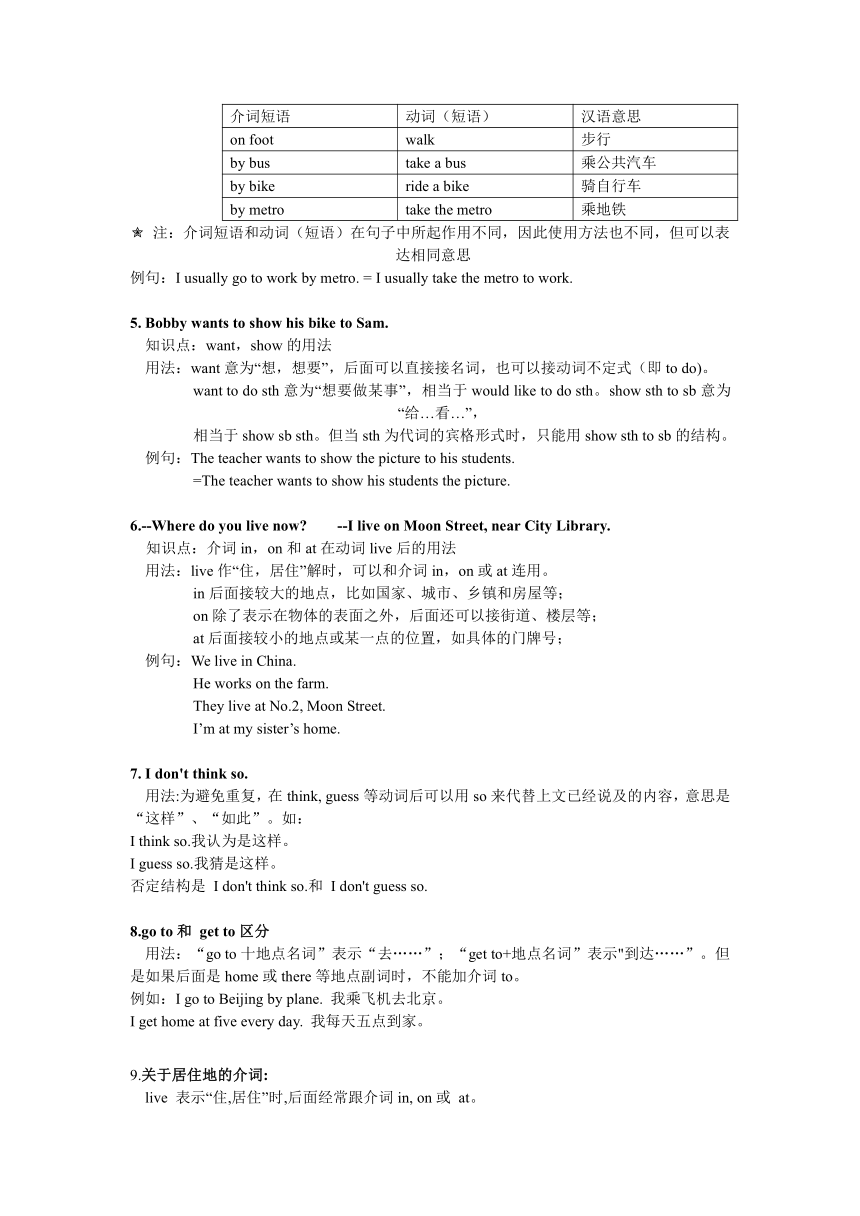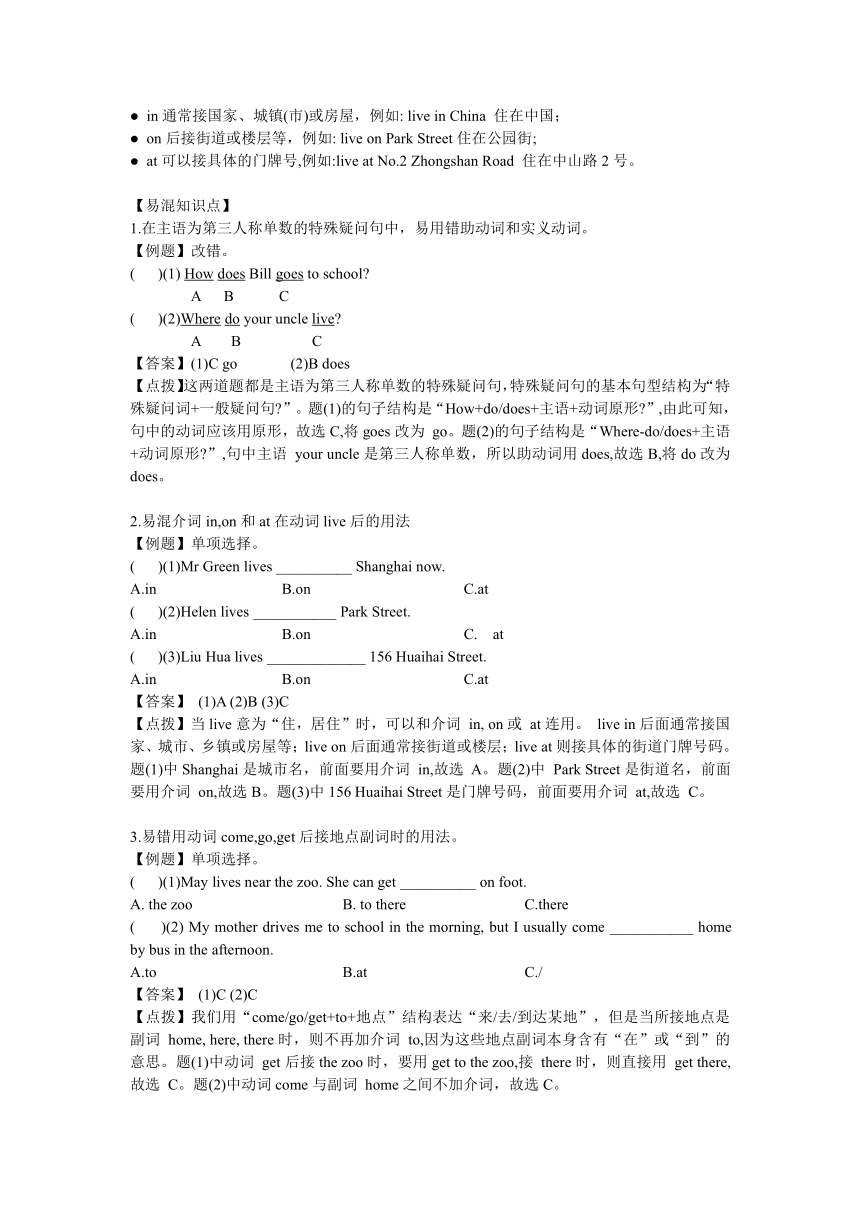(译林版三起) Unit 2 How do you come to school 讲义(含答案)
文档属性
| 名称 | (译林版三起) Unit 2 How do you come to school 讲义(含答案) |  | |
| 格式 | docx | ||
| 文件大小 | 34.7KB | ||
| 资源类型 | 教案 | ||
| 版本资源 | 牛津译林版 | ||
| 科目 | 英语 | ||
| 更新时间 | 2024-02-19 13:22:31 | ||
图片预览





文档简介
江苏译林5BUnit2 How do you come to school基础版教案
教学目标
1.巩固本单元新单词
2.掌握本单元的重难点句型并熟练运用
I.默写通关
一、重点词汇。
1.巴士______________ 2.在......附近____________ 3.出租车______________
4.给......看____________ 5.年轻的________________ 6.自行车______________
7.乘(汽车等)__________8.篮子_________________ 9.街道______________
10.城市(复数)_________11.骑_________________ 12.轮船_______________
二、重点短语。(英汉互译)
1. 住在月亮街______________________ 11.乘火车______________________
2. 在城市图书馆附近________________ 12.步行________________________
3. 到学校来________________________ 13.乘地铁______________________
4. 住在学校附近____________________ 14.去许多城市__________________
5. 在街上__________________________ 15.骑自行车去那儿______________
6. 有一辆新自行车__________________ 16.太老________________________
7. sit in the basket____________________ 17. too young_____________________
8. show his bike to Sam________________18.like it very much_______________
9. talk about public transport_____________19.would like to ride bikes__________
10.far from school_____________________20. work on a big ship______________
三、翻译下列句子或对话。
1.-你喜欢你的新家吗? -是的,它很大。
______________________________________________
2. 我十分喜欢它,但它离学校很远。
______________________________________________
3. 你现在住在哪里?
______________________________________________
4.我住在月亮街,靠近城市图书馆。
______________________________________________
5.苏阳和我坐公交车来学校。
______________________________________________
6.我住得离学校近。我步行来学校。
______________________________________________
7.鲍勃想要展示他的自行车给萨姆看。
______________________________________________
8. 萨姆怎么去学校的?
______________________________________________
9. 他骑自行车去的。
______________________________________________
10. 他坐船去很多城市。
______________________________________________
11. 苏海和苏阳住得离学校远。
______________________________________________
12.我住在阳光镇。我乘地铁来学校。
______________________________________________
13.我住在公园街。我乘出租车来学校。
______________________________________________
14. 他喜欢在公园里骑自行车。
______________________________________________
15. 鲍勃的爸爸不这样认为。
______________________________________________
16. 他总是坐在篮子里。
______________________________________________
17. 我叔叔在一艘大船上工作。
______________________________________________
这辆自行车很酷!
______________________________________________
Ⅱ.语音
语音:字母“tr”的发音
总结:
字母组合tr在单词中可发/tr/音:
train travel tree trousers traffic try true trick treat truck
trap trip trouble
选出每组单词中画线部分读音不同的一项。
( )1.A.train B.metro C.drive D.street
( )2.A.through B.thank C.clothes D.three
( )3.A.cake B.happy C.back D.taxi
( )4.A.mouse B.house C.cousin D.about
( )5.A.pick B.ship C.bike D.city
( )6.A.shine B.ship C.school D.shop
( )7.A.which B.where C.what D.whose
( )8.A.right B.light C.film D.ride
( )9.A.blouse B.out C.shout D.young
( )10.A.hurry B.duck C.use D.umbrella
( )11.A.train B.travel C.three D.try
( )12.A.through B.thank C.there D.third
( )13.A.here B.where C.near D.hear
( )14.A.next B.excuse C.get D.elephant
( )15.A.full B.push C.put D.but
III.重难点词汇讲解
1. I like it very much, but it’s far from school.
知识点:far from为副词短语,意为“离....远”
用法:后接地点,其反义词为near,反义短语为close to
例如:Helen lives near our school,but I live far from it.
Our new house is close to the supermarket.
2. --Where do you live now
--I live on Moon Street, near City Library.
知识点:where引导的特殊疑问句
用法:用来询问别人住在哪里,句型结构为“Where十do/does十主语+live ”,其答句为“主语十
live(s)in/on/near/...十地点”。
例如: (1) --Where does Gao Shan live
--He lives in Sunshine Town.
(2) --Where do your grandparents live
--They live near the park.
3. How do you come to school
知识点:how引导的特殊疑问句
用法:问句是由how引导的特殊疑问句,how为疑问副词,意为“怎么样”,此处用来询问别人上学的方式。
拓展:how的其他常用用法:
用来询问身体状况或天气。
后接其他形容词或副词,构成疑问短语how old“多大”(用来询问年龄),how many“多少”(用来询问可数名词的数量),how much “多少”(用来对不可数名词进行提问)或“多少钱”(用来询问价格),how long“多长”(用来询问物体的长度) 或“多久”(用来对一段时间进行提问)。
例如:(1)--How does your mother go to work --She goes to work by metro.
(2)How is the weather today
(3)--How long is this bridge --About eighty metres.
(4)--How long does it take you to do your homework every day --About two hours.
4. Su Yang and I come to school by bus.
知识点: by +交通工具
用法: by意为“乘(汽车、火车等)”, “by十交通工具名词”表示“乘....”。
by +交通工具(此介词短语常放在句末)
by后的名词只能用单数,前面不能加冠词(a, an, the)或物主代词,如:
We often go to school by bus. (√)
We often go to school by the bus. (×)
例题:I go to Suzhou _________.
A. by a metro B. by a plane C. by metro
拓展:表示乘坐某种交通工具还可以用“take十冠词十交通工具名词”,如take a taxi,take the metro
等。注意,“步行”译为on foot,“骑自行车”译为ride a bike/bikes, 需要特别记忆。
常见出行方式用语:
介词短语 动词(短语) 汉语意思
on foot walk 步行
by bus take a bus 乘公共汽车
by bike ride a bike 骑自行车
by metro take the metro 乘地铁
注:介词短语和动词(短语)在句子中所起作用不同,因此使用方法也不同,但可以表达相同意思
例句:I usually go to work by metro. = I usually take the metro to work.
5. Bobby wants to show his bike to Sam.
知识点:want,show的用法
用法:want意为“想,想要”,后面可以直接接名词,也可以接动词不定式(即to do)。
want to do sth意为“想要做某事”,相当于would like to do sth。show sth to sb意为“给…看…”,
相当于show sb sth。但当sth为代词的宾格形式时,只能用show sth to sb的结构。
例句:The teacher wants to show the picture to his students.
=The teacher wants to show his students the picture.
6.--Where do you live now --I live on Moon Street, near City Library.
知识点:介词in,on和at在动词live后的用法
用法:live作“住,居住”解时,可以和介词in,on或at连用。
in后面接较大的地点,比如国家、城市、乡镇和房屋等;
on除了表示在物体的表面之外,后面还可以接街道、楼层等;
at后面接较小的地点或某一点的位置,如具体的门牌号;
例句:We live in China.
He works on the farm.
They live at No.2, Moon Street.
I’m at my sister’s home.
7. I don't think so.
用法:为避免重复,在think, guess等动词后可以用so来代替上文已经说及的内容,意思是“这样”、“如此”。如:
I think so.我认为是这样。
I guess so.我猜是这样。
否定结构是 I don't think so.和 I don't guess so.
8.go to和 get to区分
用法:“go to十地点名词”表示“去……”;“get to+地点名词”表示"到达……”。但是如果后面是home或there等地点副词时,不能加介词to。
例如:I go to Beijing by plane. 我乘飞机去北京。
I get home at five every day. 我每天五点到家。
9.关于居住地的介词:
live 表示“住,居住”时,后面经常跟介词in, on或 at。
in通常接国家、城镇(市)或房屋,例如: live in China 住在中国;
on后接街道或楼层等,例如: live on Park Street住在公园街;
at可以接具体的门牌号,例如:live at No.2 Zhongshan Road 住在中山路2号。
【易混知识点】
1.在主语为第三人称单数的特殊疑问句中,易用错助动词和实义动词。
【例题】改错。
( )(1) How does Bill goes to school
A B C
( )(2)Where do your uncle live
A B C
【答案】(1)C go (2)B does
【点拨】这两道题都是主语为第三人称单数的特殊疑问句,特殊疑问句的基本句型结构为“特殊疑问词+一般疑问句 ”。题(1)的句子结构是“How+do/does+主语+动词原形 ”,由此可知,句中的动词应该用原形,故选C,将goes改为 go。题(2)的句子结构是“Where-do/does+主语+动词原形 ”,句中主语 your uncle是第三人称单数,所以助动词用does,故选B,将do改为does。
2.易混介词in,on和at在动词live后的用法
【例题】单项选择。
( )(1)Mr Green lives __________ Shanghai now.
A.in B.on C.at
( )(2)Helen lives ___________ Park Street.
A.in B.on C. at
( )(3)Liu Hua lives _____________ 156 Huaihai Street.
A.in B.on C.at
【答案】 (1)A (2)B (3)C
【点拨】当live意为“住,居住”时,可以和介词 in, on或 at连用。 live in后面通常接国家、城市、乡镇或房屋等;live on后面通常接街道或楼层;live at则接具体的街道门牌号码。题(1)中Shanghai是城市名,前面要用介词 in,故选 A。题(2)中 Park Street是街道名,前面要用介词 on,故选B。题(3)中156 Huaihai Street是门牌号码,前面要用介词 at,故选 C。
3.易错用动词come,go,get后接地点副词时的用法。
【例题】单项选择。
( )(1)May lives near the zoo. She can get __________ on foot.
A. the zoo B. to there C.there
( )(2) My mother drives me to school in the morning, but I usually come ___________ home by bus in the afternoon.
A.to B.at C./
【答案】 (1)C (2)C
【点拨】我们用“come/go/get+to+地点”结构表达“来/去/到达某地”,但是当所接地点是副词 home, here, there时,则不再加介词 to,因为这些地点副词本身含有“在”或“到”的意思。题(1)中动词 get后接the zoo时,要用get to the zoo,接 there时,则直接用 get there,故选 C。题(2)中动词come与副词 home之间不加介词,故选C。
IV.语法(特殊疑问句)
由where和how提问的特殊疑问句。注意句子的结构、人称的变化、动词形式的变化以及介词的搭配。一般句式为:疑问词+一般疑问句的语序?
1.where用作疑问副词,在(往、从)哪里,在什么地方:
Where are you 你在哪儿?
Where are my gloves 我手套在哪里?
Where do you live 你住在哪儿?
I live in Suzhou. ------ Where do you live
He is on Moon Road. ------ Where is he
同时,老师们有必要给学生复习一下学过的表示地点的介词:in, on, at, near, behind, beside, between, under…
2.how在英语中通常用作副词,是特殊疑问句中本领最大的疑问词。
①(表方式、方法)怎样;怎么 (本单元所学的就是表示方式、方法)
I go to school by bike. ----- How do you go to school
My father goes to work by car. ------ How does your father go to work
How do you usually go to school 你怎样去上学 (交通方式)
How does she study English 她是怎样学习英语的?
我们之前还学过其他用how提问的句式,如:
②(指健康等情况)怎样
How is Miss Zhang 张小姐身体好吗
—How are you —Fine, thank you.
How do you feel 你感觉怎么样?
③(询问天气)怎样
How is the weather in Beijing 北京的天气怎样?
相当于What’s the weather like in Beijing
④(指数量、程度)多少,后接其它形容词或副词,可以构成各类疑问词。
How many students are there in your class 你班里有多少学生 (How many 多少)
How long will you stay here 你要在这儿呆多久? (How long 多久)
How often do you go to a movie 你好久看一次电影? (How often 多久一次)
How far is your home from the library 你家离图书馆有多远? (How far 多远)
V.基础练习
判断下列每组单词画线部分的读音是(S)否(D)相同。
( )1.near where ( )2.town show
( )3.trousers travel ( )4.train street
( )5.moon school ( )6.bike ride
( )7.put bus ( )8.park card
用所给词的适当形式填空。
1.How your brothers (come) to school
2.Yang Ling's grandparents (live) in a small town.
3.My father often (fly) to Beijing.
4. he (do) his homework every day
5.Aunt Mary is a metro . She likes . (drive)
6.--Can he a horse --Yes, he can. Look! He is now. (ride)
7.His home (be) far from school.
8.What about (go) (swim) this afternoon
从方框中选择合适的单词填空,每个单词可重复填写。
on in do does far from
1.--Where they live --They live the school.
2.--How your father go to work --He goes to work by car.
3.My e-friend lives a big country(国家).
4.Helen and her family live No.1 Street.
5.Your teacher not think so.
单项选择。
( )1.--Where you live --I live near the zoo.
A.are B.can C.do
( )2.Let's go to the park .
A.on foot B.by feet C.to walking
( )3.I like playing in Disneyland, but it is my home.
A.far away B.far from C far off
( )4.Su Hai lives Moon Street.
A.in B.on C.behind
( )5.--How Jenny go to school --She to school by school bus.
A.does;go B.do;go C.does;goes
按要求完成句子。
1.The twins go to the zoo by metro. (对画线部分提问)
the twins to the zoo
2.My cousin Nancy lives in Park Town. (对画线部分提问)
cousin Nancy
3.Helen lives far from her school. (改为同义句)
Helen live her school.
4.My mother goes to work by car. (改为同义句)
My mother work.
根据中文提示完成句子或对话。
--小鸟波莉为什么不开心? --因为她飞不高。
-- the little bird Polly
-- she can’t .
波比非常喜欢在公园里骑他的自行车。
Bobby in the very much.
罗斯经常给我们看她的花。
Rose often .
戴维有一列新的玩具火车。
David a new .
公共汽车上的轮子转了一圈又一圈。
The wheels round and round.
将下列句子重新排序,使其成为一段通顺的对话。
I’m going to the library. I like reading books there at weekends.
Sounds great! By the way, how do you go there
Where are you going, Mike
Are there any interesting storybooks there
I’d like to. But I don’t have a bike. Shall we go there by bus
I usually go there by bike. Would you like to go with me
OK. Let’s go.
Yes. Hundreds of them.
C
参考答案
I.一、1.bus 2.near 3.taxi
4. show 5.young 6.bike
7.by 8.basket 9.street
10.cities 11. ride 12. ship
二、1. live on Moon Street 11.by train
2. near City Library 12.on foot
3. come to school 13. by metro
4. live near school 14. go to many cities
5. on the street 15.go there by bike
6. have a new bike 16. too old
7. 坐在篮子里 17. 太年幼
8. 给萨姆看他的自行车18.非常喜欢它
9. 谈论公共交通 19.想骑车
10.远离学校 20. 在一个大船上工作
三、-Do you like your new home -Yes, it's very big.
2. I like it very much, but it's far from school.
3. Where do you live now
4.I live on Moon Street, near City Library.
5.Su Yang and I come to school by bus.
6.I live near school. I come to school on foot.
7.Bobby wants to show his bike to Sam.
8. How does Sam go to school
9. He goes to school by bike.
10. He goes to many cities by ship.
11. Su Hai and Su Yang live far from school.
12.I live in Sunshine Town. I come to school by metro.
13.I live on Park Street. I come to school by taxi.
14. He likes riding the bike in the park.
15. Bobby's dad does not think so.
16. He always sits in the basket.
17. My uncle works on a big ship.
18.This bike is very cool!
II.语音
1.C 2.C 3.A 4.C 5.C
6.C 7.D 8.C 9.D 10.C
11.C 12.C 13.B 14.B 15.D
V.基础练习
1-5.DDSSS 6-8.SDS
1.do, come 2.live 3.flies 4.Does, do 5.driver, driving
7.is 8.going, swimming
1.do, in 2.does 3.in 4.on 5.does
CABBC
1.How do, go 2.Where does your, live 3.doesn’t, near
4.drives to
1.Why is, not happy, Because, fly high 2.likes riding his bike, park
3.shows us her flowers 4.has, toy train 5.on the bus go
CADHBFEG
教学目标
1.巩固本单元新单词
2.掌握本单元的重难点句型并熟练运用
I.默写通关
一、重点词汇。
1.巴士______________ 2.在......附近____________ 3.出租车______________
4.给......看____________ 5.年轻的________________ 6.自行车______________
7.乘(汽车等)__________8.篮子_________________ 9.街道______________
10.城市(复数)_________11.骑_________________ 12.轮船_______________
二、重点短语。(英汉互译)
1. 住在月亮街______________________ 11.乘火车______________________
2. 在城市图书馆附近________________ 12.步行________________________
3. 到学校来________________________ 13.乘地铁______________________
4. 住在学校附近____________________ 14.去许多城市__________________
5. 在街上__________________________ 15.骑自行车去那儿______________
6. 有一辆新自行车__________________ 16.太老________________________
7. sit in the basket____________________ 17. too young_____________________
8. show his bike to Sam________________18.like it very much_______________
9. talk about public transport_____________19.would like to ride bikes__________
10.far from school_____________________20. work on a big ship______________
三、翻译下列句子或对话。
1.-你喜欢你的新家吗? -是的,它很大。
______________________________________________
2. 我十分喜欢它,但它离学校很远。
______________________________________________
3. 你现在住在哪里?
______________________________________________
4.我住在月亮街,靠近城市图书馆。
______________________________________________
5.苏阳和我坐公交车来学校。
______________________________________________
6.我住得离学校近。我步行来学校。
______________________________________________
7.鲍勃想要展示他的自行车给萨姆看。
______________________________________________
8. 萨姆怎么去学校的?
______________________________________________
9. 他骑自行车去的。
______________________________________________
10. 他坐船去很多城市。
______________________________________________
11. 苏海和苏阳住得离学校远。
______________________________________________
12.我住在阳光镇。我乘地铁来学校。
______________________________________________
13.我住在公园街。我乘出租车来学校。
______________________________________________
14. 他喜欢在公园里骑自行车。
______________________________________________
15. 鲍勃的爸爸不这样认为。
______________________________________________
16. 他总是坐在篮子里。
______________________________________________
17. 我叔叔在一艘大船上工作。
______________________________________________
这辆自行车很酷!
______________________________________________
Ⅱ.语音
语音:字母“tr”的发音
总结:
字母组合tr在单词中可发/tr/音:
train travel tree trousers traffic try true trick treat truck
trap trip trouble
选出每组单词中画线部分读音不同的一项。
( )1.A.train B.metro C.drive D.street
( )2.A.through B.thank C.clothes D.three
( )3.A.cake B.happy C.back D.taxi
( )4.A.mouse B.house C.cousin D.about
( )5.A.pick B.ship C.bike D.city
( )6.A.shine B.ship C.school D.shop
( )7.A.which B.where C.what D.whose
( )8.A.right B.light C.film D.ride
( )9.A.blouse B.out C.shout D.young
( )10.A.hurry B.duck C.use D.umbrella
( )11.A.train B.travel C.three D.try
( )12.A.through B.thank C.there D.third
( )13.A.here B.where C.near D.hear
( )14.A.next B.excuse C.get D.elephant
( )15.A.full B.push C.put D.but
III.重难点词汇讲解
1. I like it very much, but it’s far from school.
知识点:far from为副词短语,意为“离....远”
用法:后接地点,其反义词为near,反义短语为close to
例如:Helen lives near our school,but I live far from it.
Our new house is close to the supermarket.
2. --Where do you live now
--I live on Moon Street, near City Library.
知识点:where引导的特殊疑问句
用法:用来询问别人住在哪里,句型结构为“Where十do/does十主语+live ”,其答句为“主语十
live(s)in/on/near/...十地点”。
例如: (1) --Where does Gao Shan live
--He lives in Sunshine Town.
(2) --Where do your grandparents live
--They live near the park.
3. How do you come to school
知识点:how引导的特殊疑问句
用法:问句是由how引导的特殊疑问句,how为疑问副词,意为“怎么样”,此处用来询问别人上学的方式。
拓展:how的其他常用用法:
用来询问身体状况或天气。
后接其他形容词或副词,构成疑问短语how old“多大”(用来询问年龄),how many“多少”(用来询问可数名词的数量),how much “多少”(用来对不可数名词进行提问)或“多少钱”(用来询问价格),how long“多长”(用来询问物体的长度) 或“多久”(用来对一段时间进行提问)。
例如:(1)--How does your mother go to work --She goes to work by metro.
(2)How is the weather today
(3)--How long is this bridge --About eighty metres.
(4)--How long does it take you to do your homework every day --About two hours.
4. Su Yang and I come to school by bus.
知识点: by +交通工具
用法: by意为“乘(汽车、火车等)”, “by十交通工具名词”表示“乘....”。
by +交通工具(此介词短语常放在句末)
by后的名词只能用单数,前面不能加冠词(a, an, the)或物主代词,如:
We often go to school by bus. (√)
We often go to school by the bus. (×)
例题:I go to Suzhou _________.
A. by a metro B. by a plane C. by metro
拓展:表示乘坐某种交通工具还可以用“take十冠词十交通工具名词”,如take a taxi,take the metro
等。注意,“步行”译为on foot,“骑自行车”译为ride a bike/bikes, 需要特别记忆。
常见出行方式用语:
介词短语 动词(短语) 汉语意思
on foot walk 步行
by bus take a bus 乘公共汽车
by bike ride a bike 骑自行车
by metro take the metro 乘地铁
注:介词短语和动词(短语)在句子中所起作用不同,因此使用方法也不同,但可以表达相同意思
例句:I usually go to work by metro. = I usually take the metro to work.
5. Bobby wants to show his bike to Sam.
知识点:want,show的用法
用法:want意为“想,想要”,后面可以直接接名词,也可以接动词不定式(即to do)。
want to do sth意为“想要做某事”,相当于would like to do sth。show sth to sb意为“给…看…”,
相当于show sb sth。但当sth为代词的宾格形式时,只能用show sth to sb的结构。
例句:The teacher wants to show the picture to his students.
=The teacher wants to show his students the picture.
6.--Where do you live now --I live on Moon Street, near City Library.
知识点:介词in,on和at在动词live后的用法
用法:live作“住,居住”解时,可以和介词in,on或at连用。
in后面接较大的地点,比如国家、城市、乡镇和房屋等;
on除了表示在物体的表面之外,后面还可以接街道、楼层等;
at后面接较小的地点或某一点的位置,如具体的门牌号;
例句:We live in China.
He works on the farm.
They live at No.2, Moon Street.
I’m at my sister’s home.
7. I don't think so.
用法:为避免重复,在think, guess等动词后可以用so来代替上文已经说及的内容,意思是“这样”、“如此”。如:
I think so.我认为是这样。
I guess so.我猜是这样。
否定结构是 I don't think so.和 I don't guess so.
8.go to和 get to区分
用法:“go to十地点名词”表示“去……”;“get to+地点名词”表示"到达……”。但是如果后面是home或there等地点副词时,不能加介词to。
例如:I go to Beijing by plane. 我乘飞机去北京。
I get home at five every day. 我每天五点到家。
9.关于居住地的介词:
live 表示“住,居住”时,后面经常跟介词in, on或 at。
in通常接国家、城镇(市)或房屋,例如: live in China 住在中国;
on后接街道或楼层等,例如: live on Park Street住在公园街;
at可以接具体的门牌号,例如:live at No.2 Zhongshan Road 住在中山路2号。
【易混知识点】
1.在主语为第三人称单数的特殊疑问句中,易用错助动词和实义动词。
【例题】改错。
( )(1) How does Bill goes to school
A B C
( )(2)Where do your uncle live
A B C
【答案】(1)C go (2)B does
【点拨】这两道题都是主语为第三人称单数的特殊疑问句,特殊疑问句的基本句型结构为“特殊疑问词+一般疑问句 ”。题(1)的句子结构是“How+do/does+主语+动词原形 ”,由此可知,句中的动词应该用原形,故选C,将goes改为 go。题(2)的句子结构是“Where-do/does+主语+动词原形 ”,句中主语 your uncle是第三人称单数,所以助动词用does,故选B,将do改为does。
2.易混介词in,on和at在动词live后的用法
【例题】单项选择。
( )(1)Mr Green lives __________ Shanghai now.
A.in B.on C.at
( )(2)Helen lives ___________ Park Street.
A.in B.on C. at
( )(3)Liu Hua lives _____________ 156 Huaihai Street.
A.in B.on C.at
【答案】 (1)A (2)B (3)C
【点拨】当live意为“住,居住”时,可以和介词 in, on或 at连用。 live in后面通常接国家、城市、乡镇或房屋等;live on后面通常接街道或楼层;live at则接具体的街道门牌号码。题(1)中Shanghai是城市名,前面要用介词 in,故选 A。题(2)中 Park Street是街道名,前面要用介词 on,故选B。题(3)中156 Huaihai Street是门牌号码,前面要用介词 at,故选 C。
3.易错用动词come,go,get后接地点副词时的用法。
【例题】单项选择。
( )(1)May lives near the zoo. She can get __________ on foot.
A. the zoo B. to there C.there
( )(2) My mother drives me to school in the morning, but I usually come ___________ home by bus in the afternoon.
A.to B.at C./
【答案】 (1)C (2)C
【点拨】我们用“come/go/get+to+地点”结构表达“来/去/到达某地”,但是当所接地点是副词 home, here, there时,则不再加介词 to,因为这些地点副词本身含有“在”或“到”的意思。题(1)中动词 get后接the zoo时,要用get to the zoo,接 there时,则直接用 get there,故选 C。题(2)中动词come与副词 home之间不加介词,故选C。
IV.语法(特殊疑问句)
由where和how提问的特殊疑问句。注意句子的结构、人称的变化、动词形式的变化以及介词的搭配。一般句式为:疑问词+一般疑问句的语序?
1.where用作疑问副词,在(往、从)哪里,在什么地方:
Where are you 你在哪儿?
Where are my gloves 我手套在哪里?
Where do you live 你住在哪儿?
I live in Suzhou. ------ Where do you live
He is on Moon Road. ------ Where is he
同时,老师们有必要给学生复习一下学过的表示地点的介词:in, on, at, near, behind, beside, between, under…
2.how在英语中通常用作副词,是特殊疑问句中本领最大的疑问词。
①(表方式、方法)怎样;怎么 (本单元所学的就是表示方式、方法)
I go to school by bike. ----- How do you go to school
My father goes to work by car. ------ How does your father go to work
How do you usually go to school 你怎样去上学 (交通方式)
How does she study English 她是怎样学习英语的?
我们之前还学过其他用how提问的句式,如:
②(指健康等情况)怎样
How is Miss Zhang 张小姐身体好吗
—How are you —Fine, thank you.
How do you feel 你感觉怎么样?
③(询问天气)怎样
How is the weather in Beijing 北京的天气怎样?
相当于What’s the weather like in Beijing
④(指数量、程度)多少,后接其它形容词或副词,可以构成各类疑问词。
How many students are there in your class 你班里有多少学生 (How many 多少)
How long will you stay here 你要在这儿呆多久? (How long 多久)
How often do you go to a movie 你好久看一次电影? (How often 多久一次)
How far is your home from the library 你家离图书馆有多远? (How far 多远)
V.基础练习
判断下列每组单词画线部分的读音是(S)否(D)相同。
( )1.near where ( )2.town show
( )3.trousers travel ( )4.train street
( )5.moon school ( )6.bike ride
( )7.put bus ( )8.park card
用所给词的适当形式填空。
1.How your brothers (come) to school
2.Yang Ling's grandparents (live) in a small town.
3.My father often (fly) to Beijing.
4. he (do) his homework every day
5.Aunt Mary is a metro . She likes . (drive)
6.--Can he a horse --Yes, he can. Look! He is now. (ride)
7.His home (be) far from school.
8.What about (go) (swim) this afternoon
从方框中选择合适的单词填空,每个单词可重复填写。
on in do does far from
1.--Where they live --They live the school.
2.--How your father go to work --He goes to work by car.
3.My e-friend lives a big country(国家).
4.Helen and her family live No.1 Street.
5.Your teacher not think so.
单项选择。
( )1.--Where you live --I live near the zoo.
A.are B.can C.do
( )2.Let's go to the park .
A.on foot B.by feet C.to walking
( )3.I like playing in Disneyland, but it is my home.
A.far away B.far from C far off
( )4.Su Hai lives Moon Street.
A.in B.on C.behind
( )5.--How Jenny go to school --She to school by school bus.
A.does;go B.do;go C.does;goes
按要求完成句子。
1.The twins go to the zoo by metro. (对画线部分提问)
the twins to the zoo
2.My cousin Nancy lives in Park Town. (对画线部分提问)
cousin Nancy
3.Helen lives far from her school. (改为同义句)
Helen live her school.
4.My mother goes to work by car. (改为同义句)
My mother work.
根据中文提示完成句子或对话。
--小鸟波莉为什么不开心? --因为她飞不高。
-- the little bird Polly
-- she can’t .
波比非常喜欢在公园里骑他的自行车。
Bobby in the very much.
罗斯经常给我们看她的花。
Rose often .
戴维有一列新的玩具火车。
David a new .
公共汽车上的轮子转了一圈又一圈。
The wheels round and round.
将下列句子重新排序,使其成为一段通顺的对话。
I’m going to the library. I like reading books there at weekends.
Sounds great! By the way, how do you go there
Where are you going, Mike
Are there any interesting storybooks there
I’d like to. But I don’t have a bike. Shall we go there by bus
I usually go there by bike. Would you like to go with me
OK. Let’s go.
Yes. Hundreds of them.
C
参考答案
I.一、1.bus 2.near 3.taxi
4. show 5.young 6.bike
7.by 8.basket 9.street
10.cities 11. ride 12. ship
二、1. live on Moon Street 11.by train
2. near City Library 12.on foot
3. come to school 13. by metro
4. live near school 14. go to many cities
5. on the street 15.go there by bike
6. have a new bike 16. too old
7. 坐在篮子里 17. 太年幼
8. 给萨姆看他的自行车18.非常喜欢它
9. 谈论公共交通 19.想骑车
10.远离学校 20. 在一个大船上工作
三、-Do you like your new home -Yes, it's very big.
2. I like it very much, but it's far from school.
3. Where do you live now
4.I live on Moon Street, near City Library.
5.Su Yang and I come to school by bus.
6.I live near school. I come to school on foot.
7.Bobby wants to show his bike to Sam.
8. How does Sam go to school
9. He goes to school by bike.
10. He goes to many cities by ship.
11. Su Hai and Su Yang live far from school.
12.I live in Sunshine Town. I come to school by metro.
13.I live on Park Street. I come to school by taxi.
14. He likes riding the bike in the park.
15. Bobby's dad does not think so.
16. He always sits in the basket.
17. My uncle works on a big ship.
18.This bike is very cool!
II.语音
1.C 2.C 3.A 4.C 5.C
6.C 7.D 8.C 9.D 10.C
11.C 12.C 13.B 14.B 15.D
V.基础练习
1-5.DDSSS 6-8.SDS
1.do, come 2.live 3.flies 4.Does, do 5.driver, driving
7.is 8.going, swimming
1.do, in 2.does 3.in 4.on 5.does
CABBC
1.How do, go 2.Where does your, live 3.doesn’t, near
4.drives to
1.Why is, not happy, Because, fly high 2.likes riding his bike, park
3.shows us her flowers 4.has, toy train 5.on the bus go
CADHBFEG
